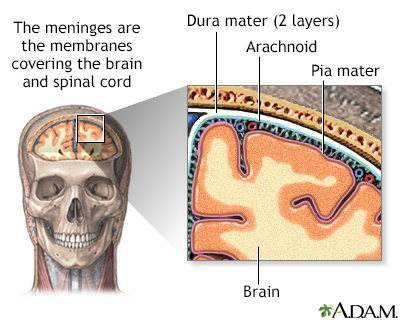West Nile virus infection
Encephalitis - West Nile; Meningitis - West Nile
West Nile virus causes a viral disease and is spread by mosquitoes. The condition ranges from mild to severe.
Images





I Would Like to Learn About:
Causes
West Nile virus was first identified in 1937 in Uganda in eastern Africa. It was first discovered in the United States in the summer of 1999 in New York. Since then, the virus has spread throughout the US.
Researchers believe the West Nile virus is spread when a mosquito bites an infected bird and then bites a person.
Mosquitoes carry the highest amounts of the virus in the late summer and early fall, which is why more people get the disease in late August to early September. As the weather becomes colder and mosquitoes die off, there are fewer cases of the disease.
Although many people are bitten by mosquitoes that carry West Nile virus, most do not know they have been infected.
Risk factors for developing a more severe form of West Nile virus include:
- Conditions that weaken the immune system, such as HIV/AIDS, organ transplants, and recent chemotherapy
- Older or very young age
- Pregnancy
West Nile virus may also be spread through blood transfusions and organ transplants. It is possible for an infected mother to spread the virus to her child through breast milk.
Symptoms
Symptoms may occur 1 to 14 days after becoming infected. Mild disease, generally called West Nile fever, may cause some or all of the following symptoms:
- Abdominal pain
- Fever, headache, and sore throat
- Lack of appetite
- Muscle aches
- Nausea, vomiting, and diarrhea
- Rash
- Swollen lymph nodes
These symptoms usually last for 3 to 6 days but may last a month.
More severe forms of the disease are called West Nile encephalitis or West Nile meningitis, depending on what part of the body is affected. The following symptoms can occur, and need prompt attention:
- Muscle weakness
- Stiff neck
- Weakness of one arm or leg
- Confusion or change in the ability to think clearly
- Loss of consciousness or coma
Exams and Tests
Signs of West Nile virus infection are similar to those of other viral infections. There may be no specific findings on a physical exam. About one half of people with West Nile virus infection may have a rash.
Tests to diagnose West Nile virus include:
- Blood test or a spinal tap to check for antibodies against the virus
- Head CT scan
- Head MRI scan
Treatment
Because this illness is not caused by bacteria, antibiotics do not treat West Nile virus infection. Supportive care may help decrease the risk for developing complications in severe illness.
Outlook (Prognosis)
People with mild West Nile virus infection do well after treatment.
For those with severe infection, the outlook is more uncertain. West Nile encephalitis or meningitis may lead to brain damage and death. One in 10 people with brain inflammation do not survive.
Possible Complications
Complications from mild West Nile virus infection are very rare.
Complications from severe West Nile virus infection include:
- Brain damage
- Permanent muscle weakness (sometimes similar to polio)
- Death
When to Contact a Medical Professional
Contact your health care provider if you have symptoms of West Nile virus infection, particularly if you may have had contact with mosquitoes. If you are very sick, go to an emergency room.
There is no treatment to avoid getting West Nile virus infection after a mosquito bite. People in good health generally do not develop a serious West Nile infection.
Prevention
The best way to prevent West Nile virus infection is to avoid mosquito bites:
- Use mosquito-repellant products containing DEET (N,N-diethyl-meta-toluamide)
- Wear long sleeves and pants
- Drain pools of standing water, such as trash bins and plant saucers (mosquitos breed in stagnant water)
Community spraying for mosquitoes may also reduce mosquito breeding.
Related Information
EncephalitisMeningitis
Chemotherapy
Polio
References
Beckham JD. Arboviruses causing fever, rash, and neurologic syndromes. In: Goldman L, Cooney KA, eds. Goldman-Cecil Medicine. 27th ed. Philadelphia, PA: Elsevier; 2024:chap 352.
Centers for Disease Control and Prevention website. West Nile virus. www.cdc.gov/west-nile-virus/. Accessed December 3, 2024.
Thomas SJ, Endy TP, Rothman AL, Barrett AD. Flaviviruses (dengue, yellow fever, Japanese encephalitis, West Nile encephalitis, Usutu encephalitis, St. Louis encephalitis, tick-borne encephalitis, Kyasanur forest disease, Alkhurma hemorrhagic fever, Zika). In: Bennett JE, Dolin R, Blaser MJ, eds. Mandell, Douglas, and Bennett's Principles and Practice of Infectious Diseases. 9th ed. Philadelphia, PA: Elsevier; 2020:chap 153.
BACK TO TOPReview Date: 11/10/2024
Reviewed By: Jatin M. Vyas, MD, PhD, Professor in Medicine, Harvard Medical School; Associate in Medicine, Division of Infectious Disease, Department of Medicine, Massachusetts General Hospital, Boston, MA. Also reviewed by David C. Dugdale, MD, Medical Director, Brenda Conaway, Editorial Director, and the A.D.A.M. Editorial team.

Health Content Provider
06/01/2025
|
A.D.A.M., Inc. is accredited by URAC, for Health Content Provider (www.urac.org). URAC's accreditation program is an independent audit to verify that A.D.A.M. follows rigorous standards of quality and accountability. A.D.A.M. is among the first to achieve this important distinction for online health information and services. Learn more about A.D.A.M.'s editorial policy, editorial process and privacy policy. A.D.A.M. is also a founding member of Hi-Ethics. This site complied with the HONcode standard for trustworthy health information from 1995 to 2022, after which HON (Health On the Net, a not-for-profit organization that promoted transparent and reliable health information online) was discontinued. |
The information provided herein should not be used during any medical emergency or for the diagnosis or treatment of any medical condition. A licensed medical professional should be consulted for diagnosis and treatment of any and all medical conditions. Links to other sites are provided for information only -- they do not constitute endorsements of those other sites. © 1997- 2025 A.D.A.M., a business unit of Ebix, Inc. Any duplication or distribution of the information contained herein is strictly prohibited.
